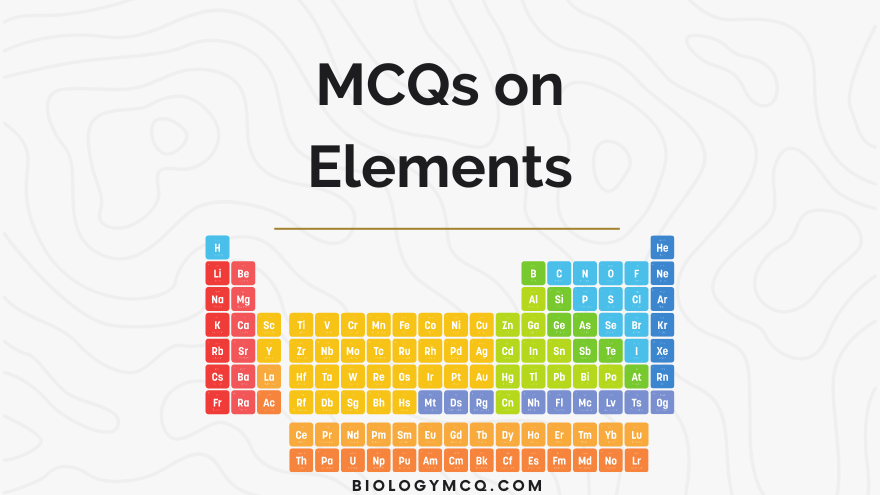Study and Learn with 1000s of Biology MCQs
Elements MCQs

Here is collection of multiple-choice questions (MCQs) on Elements that explores topics such as their properties, classification, and roles in chemical reactions.
These MCQs will help you prepare for an exam or seeking to deepen your understanding of chemistry, these MCQs offer valuable learning opportunities for students and enthusiasts alike.
Let’s dive into the MCQs below and expand your knowledge of the building blocks of matter!
MCQ on Elements
Each row of the periodic table is called?
period
group
rank
All of these
period
Each column of the periodic table is called?
period
group
rank
All of these
group
The size of the atom _____ from top to bottom within each column
increases
Decreases
Remains same
None of these
increases
Elements are fundamental substances that cannot be broken down into simpler substances by chemical means. They consist of atoms with the same number of protons in their nuclei.
_____ ions joining to form table salt
Carbonate and bicarbonate
Sulphate and chloride
Sodium and chloride
Calcium and potassium
Sodium and chloride
Sodium and chloride ions joining to form _____
protein
table salt
carbohydrate
DNA
table salt
Sodium ion has _____ charge
Positive
Negative
Neutral
None of these
Positive
chloride ion has _____ charge
Positive
Negative
Neutral
None of these
Negative
Number of protons in sodium is?
11
13
43
23
11
Number of protons in chlorine is?
11
13
35
23
35
Number of protons in oxygen is?
11
8
35
23
8
Between 2 oxygen atoms, there is?
Ionic bond
Covalent bond
Metallic bond
None of these
Covalent bond
atomic number is the number of _____ in the nucleus of an atom of a particular element
Neutrons
Leptons
neutrinos
Protons
Protons
_____ is the number of in the nucleus of an atom of a particular element
atomic number
Atomic volume
atomic density
Atomic mass
atomic number
Symbol of carbon is?
D
Cr
C
Cb
C
carbon (the letter C in the periodic table) has _____ protons in the nucleus of one atom
4
6
65
11
6
All atoms of an element have the same number of protons, but the number of neutrons can change. If the number of neutrons is different between two atoms of the same element, the atoms are called _____ of the element.
Thermotopes
Metatopes
isen tropes
isotopes
isotopes
Carbon has _____ isotopes
2
3
4
5
2
The _____ of an element is the average mass of all the isotopes of that element, taking into account their relative abundance
atomic number
Atomic volume
atomic density
Atomic mass
Atomic mass



